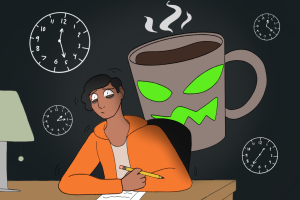Know your alcohol-related rights and responsibilities
November 30, 2022
During Halloweekend, I saw a girl, barely conscious, being carried by her friends into her dorm. I later learned that the girl had to stay the night at a hospital and if not for the help of bystanders, her friends would have left her alone in her dorm room.
This is not a normal occurrence. Yet, reactions to being inebriated often downplay the seriousness of the situation. Different degrees of intoxication require different amounts of attention. After a night of heavy drinking, not every person can be tucked into bed and kissed goodnight.
Students need to understand how tolerances differ and recognize the signs of alcohol poisoning before entering a high-risk setting.
The most common symptoms of alcohol poisoning include mental confusion, unconsciousness, vomiting and low body temperature. Students should familiarize themselves with the degrees to which alcohol affects the body, so they know when a situation becomes dangerous.
According to the National Institutes of Health, college years are the most vulnerable time for alcohol-related consequences. Unstructured time and the lack of parental supervision create a high-risk environment for new drinkers. The responsibility for a student’s well-being can rest on the shoulders of their friends or other bystanders, which is why the community needs to be educated about alcohol and its misuse.
Although it is less commonly known, UT’s SHIFT initiative promotes a safer drinking culture instead of discouraging alcohol use. Through SHIFT’s hands-on education, students can better equip themselves for encounters of alcohol abuse on or near campus by integrating themselves into the UT community.
“For SHIFT, it’s not so much about what decision a student makes, it’s about cultivating mindful decision making,” said Kate Lower, the director of SHIFT. “So whatever a student’s choice is, they know their resources, they know where to get help if they need it.”
Crisis prevention education would be crucial to a moment in time when a student’s life may be in danger. Ally Mark, co-founder of Longhorns for Harm Reduction, believes students should not only know the signs of alcohol poisoning, but also their legal rights. The state and the University have amnesty laws that protect students calling for help or experiencing the medical emergency.
“A lot of people don’t know how to recognize the signs of alcohol overdose and what to do in that situation, but really UT has a solid infrastructure setup,” Mark said.
Even though UT educates its students through its required AlcoholEdu modules, those lessons are easy to forget as the semester continues. Students have to take a more active role in educating themselves about alcohol use and safety.
“We are seeing more students feel better equipped in order to do bystander intervention and yet, I think it’s something that I hope to see continue to grow,” Lower said. “Everyone should feel equipped to call for help. Everyone should have that sense of empowerment.”
Monday is a Health and Society and Plan II freshman from Houston, TX.
















